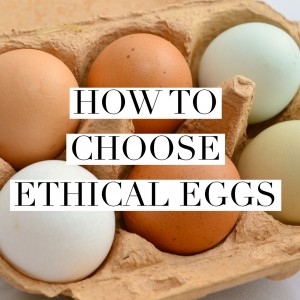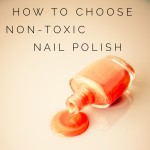Not that many years ago it seemed the only choice to be made when buying eggs was between caged eggs and free range eggs, but that’s definitely no longer the case. Now there are eggs labelled caged, barn-laid, organic, free range, pastured raised, cage-free and a whole host of other terms. It’s all gotten rather confusing! So, today I want to help with all this with my how-to guide for choosing ethical eggs!

It’s great that as a society we have taken huge leaps towards demanding more ethical treatment of laying hens, however unfortunately this hasn’t always translated to clear labelling of the eggs we’re purchasing due to a lack of nationally-recognised standard. This means that ‘free-range’ can mean different things depending on which certification body has been used, and these can vary wildly in terms of number of hens per hectare – from 1,500 (the figure considered the ideal maximum by the Model Code of Practice) up to 10,000 hens under some schemes. Before we dive too far into this, let’s first explore what the different labels mean.
The main labels:
- Cage: Eggs labelled as caged means the hens have been continually housed in cages, within a shed.
- Barn Laid: Barn laid eggs come from hens that are free to roam within a shed, without being confined to cages.
- Free Range: free-range eggs come from hens that are housed in sheds but have access to an outdoor range
Other common labels:
- Cage free: this really is just another way to say barn laid eggs, so the hens are kept inside a shed but not in cages
- Pasture raised: these hens are generally free to wander outdoors in pastures most of the time, as opposed to free range hens which may only be let out on occasion, making these eggs in actual fact more free range than some ‘free-range’ labelled hens (I hope you follow that!)
The other confusing part about choosing ethical eggs is that even if the hens were able to wander freely that doesn’t necessarily mean the hens have been fed any differently to birds that are kept solely in cages. This could include all kinds of things including animal-products, so to be clear on what the hens have been fed it’s best to choose organic eggs. Be careful to choose eggs that have been certified organic and display the relevant third-party certification logo to ensure you’re not being tricked by the use of the word organic.
The other benefit of choosing certified organic eggs is that in order to meet that certification the hens are not able to be de-beaked, which can still occur with some certified free-range eggs, depending on which certification body is used. Cage and barn hens are kept in such high numbers that they tend to get frustrated and peck at other hens, so they have their beaks removed in order to reduce the damage they can inflict. It’s definitely not a good outcome for the poor little hens.
So, coming back to the different free-range standards, here are some of the common certifications and the maximum number of hens allowed under each of them:
- Free Range Farmers Association (Victoria) – 750 birds per hectare
- RSPCA – 1500 or 2500 birds per hectare (depending on other factors)
- Coles and Woolworths branded “free-range” eggs – 10,000 birds per hectare
So where does all this leave us?
The bottom line here is that choosing ethical eggs is currently a confusing business, but don’t despair! Here’s a few things you can do to make sure you’re choosing eggs that come from happy hens:
- whenever possible choose certified organic eggs
- look up the egg producer on the Animal Welfare website which provides information on farming practices including the number of hens per hectare as well as their use of hormones, whether they are independently audited and whether they allow beak removal and wing trimming
- purchase eggs labelled ‘free range pastured’ or similar
- buy your eggs at a farmer’s market and chat to the producer about the farm, its practices and how the hens are kept






THE HUNGRY MUM
June 17, 2015 at 9:50 am (9 years ago)I have been buying free range eggs forever but after the recent Choice campaign I am more bewildered than ever about what to buy. We had chooks for a while so we didn’t need to buy eggs but their deaths were too upsetting to buy more. Thanks for this post – everyone needs to read it.
THE HUNGRY MUM recently posted…Black velvet cupcakes
I Spy Plum Pie (admin)
June 20, 2015 at 5:46 pm (9 years ago)So glad you found this useful, it’s such a minefield out there isn’t it. I wish the regulations were stronger, but for now all we can do is help educate people
Sammie @ The Annoyed Thyroid
June 17, 2015 at 6:49 pm (9 years ago)First things first, massive congrats on your Voices nomination! Yay! I was horrified by the Choice report. I really want to buy ethical eggs, so appreciate all the top tips, If I’m going to put all my eggs in one basket, I’m going to have to go organic!
Sammie @ The Annoyed Thyroid recently posted…Wednesday Words of Wisdom – A Good Day to Say Thank You
I Spy Plum Pie (admin)
June 20, 2015 at 5:48 pm (9 years ago)Thanks Sammie, you too!
Glad you found this helpful, it sure is confusing out there!
merilyn
June 17, 2015 at 7:37 pm (9 years ago)appreciate the info! … thanks liz!
my neighbour gets eggs for us from his son’s farm. the grandchildren collect them and they get the money $3.50 per doz! we are so happy about that! love m:)X
I Spy Plum Pie (admin)
June 20, 2015 at 5:49 pm (9 years ago)Oh that would be perfect! Lucky you Merilyn!
Jodi Gibson (JF Gibson Writer)
June 19, 2015 at 9:32 pm (9 years ago)Fantastic post. Thank you for sharing this information. Although we are fortunate enough to get our eggs from a local private farm, occasionally I do need a half dozen to tide us over, so this helps in what can be a confusing choice.
I Spy Plum Pie (admin)
June 20, 2015 at 5:50 pm (9 years ago)Thanks Jodi, I’m so glad lots of people are finding it helpful. I just wish it wasn’t so confusing in the first place!
Amy @ Handbagmafia
June 20, 2015 at 12:32 pm (9 years ago)Hi there, great post! So many don’t know the difference! I wanted to share another blog I read recently on a similar topic, it’s about what free range means, brand to brand- there’s quite a variation and I found it really helpful http://www.wonderfullywomen.com/not-all-free-range-eggs-are-created-equal/
Amy @ Handbagmafia recently posted…Body Hair: A Transgender Perspective
I Spy Plum Pie (admin)
June 20, 2015 at 5:51 pm (9 years ago)Awesome, thanks so much for sharing that Amy, I’ll head over and have a read right now!
Mrs M
June 20, 2015 at 5:34 pm (9 years ago)It’s ridiculous how confusing the most simple of things are made these days. so frustrating. I never buy caged eggs. I try best to do my bit.
Mrs M recently posted…Phuket, Thailand
I Spy Plum Pie (admin)
June 20, 2015 at 5:52 pm (9 years ago)It really is ridiculous, isn’t it. Trying our best is all we can really do!
Amanda
June 20, 2015 at 6:09 pm (9 years ago)It’s rather disturbing that we even need to have a guide about this..I really think that eggs should all be organic and free range I hate the fact that any chickens at all are kept in cages.
Amanda recently posted…Winter To Do List
I Spy Plum Pie (admin)
June 24, 2015 at 9:28 pm (9 years ago)I definitely agree Amanda, and at the very least we should have better labelling laws so people can easily make informed decisions
Karin @ Calm to Conniption
June 24, 2015 at 8:12 pm (9 years ago)Thank you! Thank you! This post has been fantastic at explaining all of the claims, brands and labels.
Karin @ Calm to Conniption recently posted…Youer Than You: Notes from #IMCONF
I Spy Plum Pie (admin)
June 24, 2015 at 9:32 pm (9 years ago)So glad you found it helpful Karin!